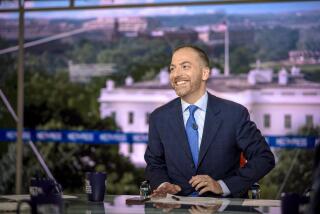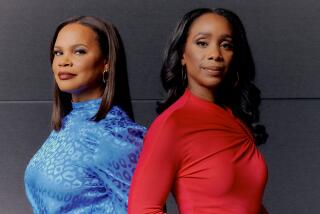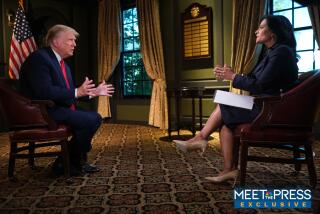Pundits With Your Pancakes
- Share via
WASHINGTON — People here tune in to the Sunday morning interview shows for the same reasons that entertainment industry executives might line up for a hot new restaurant in L.A. Partly it’s for nourishment. Partly for entertainment. Mostly, it’s to keep up on who’s sitting at the good tables.
Author and editor James Fallows once keenly observed that Washington is like a big high school where everybody recognizes the varsity. The Sunday interview shows are among the places that give out the letters.
That’s true to some extent for journalists (full disclosure: as an occasional participant on, first, “Meet the Press” and, more recently, “Face the Nation,” I’ve been a novitiate in this order for the last few years), but even more so for politicians. Being invited to sit around the big table and cross swords with Tim or Bob or Sam and Cokie is a universal sign of making it, especially in Congress.
The televised Washington talk show marks a milestone this week, with the 50th anniversary of NBC’s “Meet the Press.” Though these shows’ national ratings are modest by prime-time standards (the most successful--”Meet the Press” and ABC’s “This Week”--each draws about 3.5 million viewers), they remain Washington rituals. They are, as “Meet the Press” host Tim Russert puts it, “video newsletters” that allow members of the capital’s elite to communicate with one another over coffee and eggs while much of America is in church or still sleeping off Saturday night.
“Meet the Press” began as a radio show on the Mutual Broadcasting System on Oct. 5, 1945, and moved to NBC two years later, on Nov. 6, first in evening prime time and then, in 1950, in the Sunday morning slot, where it has been a fixture ever since.
For its first three decades, “Meet the Press” was dominated by the diminutive but formidable Lawrence E. Spivak, who conceived the idea (along with radio personality Martha Rountree, who served as the first moderator) and then nurtured it as a permanent panelist and later the host.
After Spivak retired in 1975, the show was eventually eclipsed by “This Week With David Brinkley,” which premiered on ABC in 1981. Russert, a blue-collar kid from Buffalo, N.Y., with an everyman face and an unvarnished zeal for politics, took the reins at “Meet the Press” in 1991 and has led the show on a steady revival since, with a marketing sense and questioning strategy both precisely defined by the same word: aggressive.
“Tim has put a real edge on it, and that’s why the show does well in terms of ratings,” says Washington Post columnist David Broder, who has appeared on the show more than any other outside reporter.
Today the five major Sunday morning interview shows are only one stream in the river of talk cascading out of Washington virtually every hour of every day--from “Equal Time” to “Technopolitics,” from “Hardball” to “Inside Politics.” Yet even within this profusion of chatter, they still occupy a unique role in the Washington ecosystem.
Part of their power is their capacity to confer status. (One senior House Republican aide says that legislators often will appear on the shows more in the hopes of impressing their colleagues than of making a point with the general public.) Even more important is the way they influence the news coverage for the next week. In the Washington news cycle, the Sunday shows function as a sort of hinge, closing out the news of the previous week and launching the arguments that the two parties will carry into the upcoming week.
They are more important than any of the other interview shows not only because they enjoy better ratings but also because newspaper editors are accustomed to running stories about their interviews in the Monday morning papers; all of the shows measure success as much by headlines as by ratings.
Like pets that come to resemble their owners, each of the five shows reflects the personality of its host.
CNN’s “Late Edition,” like moderator Frank Sesno, is serious, evenhanded and self-effacing. Bob Schieffer’s deliberate, quintessentially Middle American skepticism shapes the unadorned style of CBS’ “Face the Nation.” “Fox News Sunday,” like its moderator, columnist Tony Snow, is irreverent, witty and adamantly conservative; self-consciously aiming at younger viewers, Snow shuttles guests in and out about every six minutes, like a teenager with an itchy finger on the remote.
With Sam Donaldson, Cokie Roberts and George Will all mixing it up, “This Week” is ABC’s Sunday morning talk as scripted by Edward Albee: often sparkling but contentious, combustible and sometimes exhausting. Under Russert, “Meet the Press” is edgy and energetic and urban; of all the shows, it has the most narrative drive.
Yet for all of these differences, the shows are still homogenized by a powerful set of common assumptions. Though each occasionally breaks the mold, all of them draw their guests principally from a rotating cast of about two dozen capital powerhouses who shuttle from show to show like old-time vaudevillians playing the circuit. In its radio days, the very first interview on “Meet the Press” was with the president of the U.S. Chamber of Commerce; but today, it’s rare for any of the shows to schedule a business or labor figure, much less a foreign leader.
It isn’t only the common cast that blurs the edges between the shows, it’s the subject matter. Russert sometimes likes to question basic assumptions (particularly on budget issues), but all the shows usually attach themselves to the week’s headlines like skiers to a rope line. (As a questioner, my greatest frustration was how narrow a range of subjects was considered relevant every week.)
This concentrated focus increases the shows’ odds of “making news” in the sense of generating a new twist in whatever argument is convulsing Washington that week. But it also means they are bounded, and even blinkered, by Washington’s insular and evanescent definition of what’s important, a framework that excludes much more than it includes.
Viewers of the shows are regularly treated to microscopic examinations of such hothouse Washington controversies as Paula Jones’ lawsuit or Newt Gingrich’s ethics; it’s much more rare for them to tackle such systemic problems as reforming education or reimagining the welfare state. With the same guests discussing the same issues, the shows can be more repetitive than any of them care to admit.
“Even more than in the old days,” says conservative columnist Robert Novak, who has appeared more than 200 times on “Meet the Press” and hosts his own interview show on CNN, “the Sunday shows are geared toward what is in the headlines.”
Actually, dredging news out of the guests has become more difficult for all the hosts. Politicians now spend so much time on television that they have become ever more difficult to dislodge from their spin; sometimes, interviewing a congressional leader on a Sunday show is like having a conversation with a voice-activated tape recorder.
“I went back and watched the old shows,” Russert says, “and the guests were much more spontaneous. They were new to the forum and to the medium. Now the answers are so formulated--pre-fabbed, boilerplate. It’s much more excruciating to get real information out of them.”
In the competition to extract news, most Washington insiders now consider Russert the leader. In ratings, “Meet the Press” and “This Week” battle to a virtual draw. (In descending order, “Face the Nation,” then Fox, then CNN trail by increasing margins.) But on “This Week,” the guests often take a back seat to the sparring of the three permanent panelists. Reading a “This Week” transcript is a revealing experience: There’s rarely a block of type more than a few lines long. In other words, hardly anyone ever gets to finish a thought, which can make it difficult to make news, or even get a word in edgewise.
Under Russert, “Meet the Press” offers guests a much more extended workout. An attorney and former Democratic operative (he worked for Sen. Daniel Patrick Moynihan of New York and former New York Gov. Mario M. Cuomo), Russert has won respect from both parties as a tenacious interviewer who does his homework (he sketches out his questions in longhand on a legal pad) and can bore in on an evasive argument more relentlessly than anyone else on television. (Sitting on the panel once, I counted Russert peppering a guest with 23 consecutive questions before turning to David Broder.)
Russert’s favorite shows tend to be high-speed collisions: two demolitions of Ross Perot that revealed the shallowness’ of the maverick billionaire’s plans to balance the federal budget and an “emotionally draining” confrontation last spring with Louis Farrakhan of the Nation of Islam.
“Tim Russert is an equal-opportunity abuser,” says Ed Gillespie, the former communications director for the Republican National Committee. “Republicans do not view Russert as unfair to them; everyone knows if you go on the show, his goal is to make news, and it may be to make news at your expense, but that is true for [House Majority Leader] Dick Armey and Pat Moynihan both.”
The two big raps against Russert (who is also NBC’s Washington bureau chief) are that he is ambitious and he likes to hear himself talk. Of course, in Washington, these are hardly singular offenses. And, in truth, what makes Russert such an effective host is his capacity not only for sustained questioning but also for sustained listening; he’s patient enough to let his guests make news.
It’s difficult to predict the long-term relevance of the Sunday talk shows. They all have difficulty attracting younger viewers. And it’s not uncommon to hear even Washington political junkies complain that by Sunday, they’re so exhausted with the week’s arguments that they can’t bear to tune in for another round. Russert worries that politics itself seems rather pastel to Americans these days: “There aren’t a lot of interesting characters right now,” he says.
But for all that, these shows aren’t likely to fade away any time soon. If anything, as cable networks continue to proliferate, creating oceans of time to be filled, the likelihood is that these newsmaker interview shows will continue to proliferate too, if for no other reason than talk is cheap.
In a sense, all of these shows are “Meet the Press’ ” children. And if that’s the case, it’s now a grandparent. MSNBC, NBC’s cyber-spunky cable sidekick, has just launched two of the network’s star younger correspondents on a new Sunday morning talk show--which analyzes the spin on all the other Sunday morning talk shows.
*
* “Meet the Press” airs Sunday mornings on NBC (Channel 4). It will celebrate its anniversary as network television’s longest-running show with a special broadcast next Sunday at 7 a.m., with President Clinton among the guests.
More to Read
The complete guide to home viewing
Get Screen Gab for everything about the TV shows and streaming movies everyone’s talking about.
You may occasionally receive promotional content from the Los Angeles Times.






